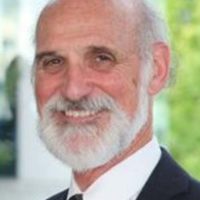The following is an essay by clinical professor emeritus Dr. Richard Rapport. The views expressed are his and not of those of UW School of Medicine.
 I knew I wanted to go to medical school by the time I was 10 years old. My thoracic surgeon father had introduced me to the local county hospital when I was five. I loved going there and watching the activity, while admittedly not fully understanding much, from that first day he stashed me in the nurses’ station as he made rounds. My dad never suggested to me that I should become a doctor, but I wanted to be like him.
I knew I wanted to go to medical school by the time I was 10 years old. My thoracic surgeon father had introduced me to the local county hospital when I was five. I loved going there and watching the activity, while admittedly not fully understanding much, from that first day he stashed me in the nurses’ station as he made rounds. My dad never suggested to me that I should become a doctor, but I wanted to be like him.
I prepared as an undergrad by taking the double major in biology and chemistry route offered at my liberal arts college to get us into med school. It worked, and I spent four of the happiest years of my life at the University of Michigan from 1965 to 1969. Believe me, even with the demands of a medical education, during those years it was impossible not to have fun in The People’s Republic of Ann Arbor.
While medical students see patients, examine them, take histories and so on, they don’t really have much responsibility for them. That’s what the intern year is about; learning to take responsibility for others. My internship seemed to me the most demanding year of my life, and was complicated by the Vietnam War, a Sword of Damocles dangling over every recently graduated physician at that moment. Everyone younger than 30 thought the war was a gigantic mistake, and it was.
In 1970, my choices for avoiding Vietnam were the Faustian bargain of the Berry Plan, Canada, jail or the USPHS, specifically NIH. But lots of my contemporaries also wanted to spend two years doing research at NIH rather than treating trauma in SE Asia, so those jobs were hard to get. Somehow I was selected. NIH not only protected me from the draft, but taught me valuable research skills. I thought I wanted to become an academic eventually as did many of my NIH contemporaries, so we all busily applied for residencies and headed toward a career. We began to become what we eventually were going to be. I certainly didn’t see “my career” that way in the beginning, but I had started to become a neurosurgeon.
There were lots of steps on that path. Residency, of course, a grueling and sometimes demeaning process of learning to do things required of the specialty, while out of necessity sometimes pretending that you already knew how to do them. I did some reasonable research, got it published, went to meetings, met people, looked for work. After I finished my residency at UW, all the academic jobs I was offered were on the east coast and in places my wife and I didn’t want to live.
So, we left the country.
There was some money remaining in a grant from the China Medical Board sending UW specialists to the University of Malaya. Along with my fellow resident and close friend we both decided we’d become better surgeons and do more good in the world by going to teach at the University of Malaya in Kuala Lumpur than by staying put. We were there as the only fully trained neurosurgeons in the country for 18 months, and treated diseases we’d never heard about or even imagined. But as the time came to return I still needed a job.
Fortunately, one was offered at what was then called Group Health Cooperative. This had appeal for a variety of reasons and I accepted. For the next 29 years I perfected my surgical abilities. From time to time, I became a medical executive, a chief of various components, served on committees, involved myself in Seattle communities, had a child. My wife began to publish books of magnificent short stories. We both became active in Seattle politics.
Nearing 65, I wasn’t the same technical surgeon I had been, and started to slow down. At that same moment, the chairman of the Department of Neurosurgery at UW needed a senior person to help manage the huge service at Harborview. I became a clinical professor, an advisor to the residents, a listener and teacher for medical students, a resource for ICU nurses. A senior figure with enough gravitas to be believable. I again served on committees, went to meetings, saw families, made rounds, lectured, put out fires.
Then I retired and it all ended. Like many goal-directed people, I was very successful at becoming. I have now started to learn how to un-become, which is harder.
I still waken at 5:30. Make my wife coffee. Eat a small breakfast. Look at my two email accounts and the news. Then.
What?
The pace of daily life has diminished to a walk. I used to catch the bus at a corner near my house that took me directly to the front door of the Ninth and Jefferson office building at Harborview in 15 minutes. I drive by that corner now with a sense of longing to again be the first one getting on, greet the driver, complain about Trump, and settle into the seat near the back door on the higher level behind an odd partition separating that seat from those getting off. The majority of the people who rode that Number 3 bus in the morning work in hospitals or clinics on pill hill, and many know one another. Therefore, real conversations occurred between seat mates and across the aisles instead of hunched faces staring fixedly at their devices while texting.
My days in the hospital were spent in comfort. Not my own comfort, but in my attempt to console very sick patients and those who loved them. That is gone from my life after 50 years of getting better at it.
There are no rounds to be made, no operations to perform, no clinics to manage, no films or charts to review, no advice to be offered, no explanations to be given to the families of the sick, no distraught residents and medical students to soothe. no meetings to attend, no papers to fill out, no “modules” to satisfy. Actually, I don’t miss the modules. Now I have to find stuff to do. I read. I write. I think. Work in the yard and garden. I still teach a little. People I know and old patients call or email me for advice now and then. I volunteer a variety of places. I can still run (well, sort of) so I do.
I spend a lot of time trying not to think about what I am un-becoming.
About the author:
Richard Rapport was a resident in neurosurgery at UW from 1973 to 1978, and then taught for two years at the University of Malaya in Kuala Lumpur. He returned to Seattle and the staff at Group Health Cooperative until he retired in 2008 when he joined the UW faculty to attend at Harborview. He was in part responsible for establishing and managing the neurosurgery Practitioner Team, as well as attending on the wards, in the NCCU, and TICU. He had some oversite responsibilities for medical students and residents during those years. When he retired from UW in 2020, he joined the faculty of the new Elson Floyd College of Medicine at WSU where he now teaches.
Dr. Rapport has written three books of non-fiction including Physician, the biography of the great internist Paul Beeson, and Nerve Endings about the discovery of the synapse. His most recent book, Seattle’s Medic One: How We Don’t Die, was published by The History Press in 2019. In addition, he has published 50 or so essays, stories and commentaries on a variety of topics both about medicine, death and dying, ethics and other oddities of life. He has recently written a novel. He lives in Seattle and Twisp with his wife Valerie Trueblood, a writer of literary short fiction. They have a son Daniel, a Seattle musician.

